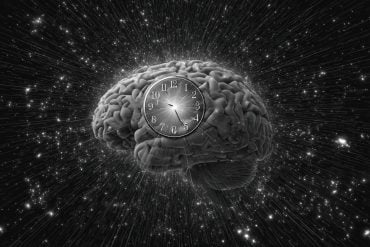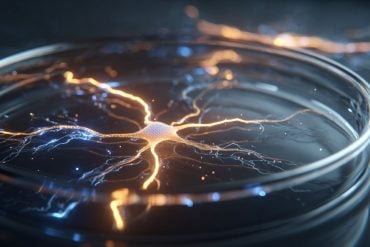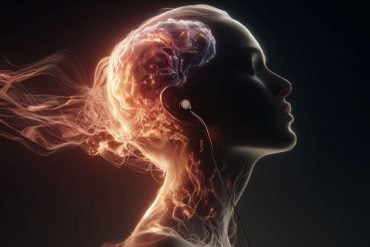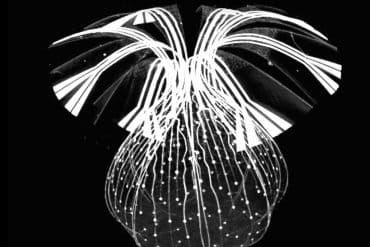Summary: Researchers have identified mutations in the non-coding gene RNU2-2 as a cause of a newly defined neurodevelopmental disorder, often accompanied by severe epilepsy. The discovery sheds light on the critical role of small non-coding genes in brain development and could affect thousands of families globally.
RNU2-2 joins RNU4-2, previously linked to a related disorder, in highlighting the importance of this gene class. The findings were made possible through large-scale genome sequencing and pave the way for better diagnosis, support, and future therapeutic research.
Key Facts:
- New Genetic Cause: Mutations in the small non-coding gene RNU2-2 are linked to a severe neurodevelopmental disorder with epilepsy.
- Spontaneous Mutations: These mutations usually arise spontaneously rather than being inherited.
- Broader Impact: The disorder may affect thousands worldwide and highlights the importance of non-coding genes in brain development.
Source: Mount Sinai Hospital
A seminal study from researchers at the Icahn School of Medicine at Mount Sinai and their collaborators in the United Kingdom, Belgium, Spain, the Netherlands, and Iceland has uncovered a new genetic cause of neurodevelopmental disorders (NDDs).
The discovery offers both closure and hope to potentially thousands of families worldwide who have long been searching for answers.

The study, published in the April 10 online issue of Nature Genetics, reveals that mutations in a small, previously overlooked non-coding gene called RNU2-2 are responsible for relatively common NDD.
Non-coding genes are genes that don’t produce proteins but may still play critical roles in regulating cell functions.
Building on their landmark discovery of RNU4-2 / ReNU syndrome last year, the research team has identified the new, related disorder caused by mutations in the non-coding gene RNU2-2. RNU4-2 / ReNU syndrome and RNU2-2 syndromes share similarities, but patients with RNU2-2 syndrome tend to be more severely affected by epilepsy.
“Our identification of RNU2-2 mutations as a cause of NDDs is particularly notable because it cements the biological significance of a class of small non-coding genes in NDDs,” says the study’s first author, Daniel Greene, PhD, Assistant Professor of Genetics and Genomic Sciences at the Icahn School of Medicine at Mount Sinai.
“These mutations tend to occur spontaneously, rather than being inherited from an affected person’s parents.”
NDDs are disorders that affect the development of the brain and nervous system. They include conditions such as intellectual disability, autism spectrum disorder, and motor disorders.
These NDDs, which often have a genetic basis, manifest in early childhood and can lead to lifelong challenges in learning, behavior, and communication. The current findings involve a newly discovered form of NDD.
“We know from years of experience supporting patients and families with rare genetic conditions how receiving a diagnosis like this can be life-changing and the first step on the journey to putting in place the right support and care,” says Sarah Wynn, PhD, Chief Executive Officer of Unique, an organization that provides support, information, and a voice for all those affected by rare chromosome or gene disorders.
Advances in genetic sequencing, including whole-genome sequencing of more than 50,000 individuals by Genomics England, made the development possible. This enabled the researchers to identify the cause of the novel disorder as mutations in RNU2-2, a gene once thought to be inactive.
The authors also identified a separate mutation in RNU2-2 that tends to arise in unaffected individuals as they age, which may have implications for age-related conditions.
“We estimate that the prevalence of RNU2-2 disorder is approximately 20 percent that of RNU4-2 / ReNU syndrome, one of the most common monogenic types of NDD. This means there must be thousands of affected families worldwide,” says senior study author Ernest Turro, PhD, Associate Professor of Genetics and Genomic Sciences at the Icahn School of Medicine at Mount Sinai.
“With a genetic diagnosis in hand, families can connect with others in similar situations, share valuable experiences, and gain a better understanding of how to manage the condition. This discovery also makes possible further research to explore the molecular mechanisms underlying the disorder,” says Dr. Turro.
About this genetics and neurodevelopment research news
Author: Karin Eskenazi
Source: Mount Sinai Hospital
Contact: Karin Eskenazi – Mount Sinai Hospital
Image: The image is credited to Neuroscience News
Original Research: Open access.
“Mutations in the snRNA gene RNU2-2 cause a severe neurodevelopmental disorder with prominent epilepsy” by Daniel Greene et al. Nature Genetics
Abstract
Mutations in the snRNA gene RNU2-2 cause a severe neurodevelopmental disorder with prominent epilepsy
The major spliceosome includes five small nuclear RNA (snRNAs), U1, U2, U4, U5 and U6, each of which is encoded by multiple genes. We recently showed that mutations in RNU4-2, the gene that encodes the U4-2 snRNA, cause one of the most prevalent monogenic neurodevelopmental disorders.
Here, we report that recurrent germline mutations in RNU2-2 (previously known as pseudogene RNU2-2P), a 191-bp gene that encodes the U2-2 snRNA, are responsible for a related disorder.
By genetic association, we identified recurrent de novo single-nucleotide mutations at nucleotide positions 4 and 35 of RNU2-2 in nine cases. We replicated this finding in 16 additional cases, bringing the total to 25.
We estimate that RNU2-2 syndrome has a prevalence of ~20% that of RNU4-2 syndrome. The disorder is characterized by intellectual disability, autistic behavior, microcephaly, hypotonia, epilepsy and hyperventilation. All cases display a severe and complex seizure phenotype.
We found that U2-2 and canonical U2-1 were similarly expressed in blood. Despite mutant U2-2 being expressed in patient blood samples, we found no evidence of missplicing.
Our findings cement the role of major spliceosomal snRNAs in the etiologies of neurodevelopmental disorders.






